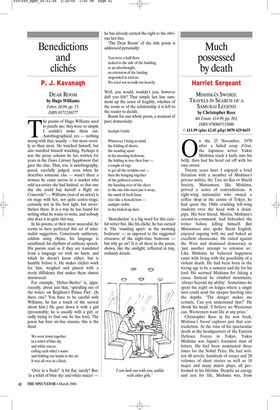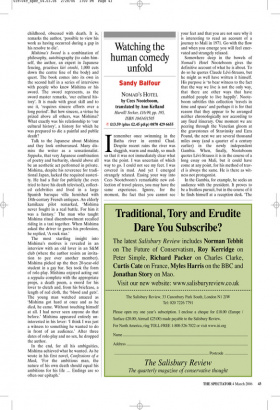Much possessed by death
Harriet Sergeant
MISHIMA’S SWORD: TRAVELS IN SEARCH OF A SAMURAI LEGEND by Christopher Ross 4th Estate, £14.99, pp. 262, ISBN 9780007135080 ✆ £11.99 (plus £2.45 p&p) 0870 429 6655 On the 25 November, 1970 after a failed coup d’état, the Japanese writer Yukio Mishima stuck a knife into his belly, then had his head cut off with his own sword.
Twenty years later I enjoyed a brief flirtation with a member of Mishima’s private militia, the Tate no Kai or Shield Society. Matsumura, like Mishima, proved a series of contradictions. A right-wing nationalist who owned a coffee shop in the centre of Tokyo, he had spent the 1960s cracking left-wing students over the head with a drainpipe. His best friend, Morita, Mishima’s second-in-command, had beheaded the writer before killing himself. But Matsumura also spoke fluent English, enjoyed arguing with me and baked an excellent cheesecake. He railed against the West and dismissed democracy as ‘just another attempt to colonise us’. Like Mishima he believed happiness came with living with the possibility of a violent death. He had been born in the wrong age to be a samurai and die for his lord. He scorned Mishima for faking a cause. Instead he climbed mountains, ‘always beyond my ability’. Sometimes he spent the night on ledges where a single turn could send the sleeper hurtling into the depths. ‘The danger makes me ecstatic. Can you understand that?’ He shook his head. ‘I believe no Westerner can. Westerners want life at any price.’ Christopher Ross in his new book, Mishima’s Sword explores just that contradiction. At the time of his spectacular death at the headquarters of the Eastern Defence Forces in Tokyo, Yukio Mishima was Japan’s foremost man of letters. He had been nominated three times for the Nobel Prize. He had written 40 novels, hundreds of essays and 20 volumes of short stories as well as 18 major and many minor plays, all performed in his lifetime. Despite an energy and zest for life, Mishima was, from childhood, obsessed with death. It is, remarks the author, ‘possible to view his work as having occurred during a gap in his resolve to die’.
Mishima’s Sword is a combination of philosophy, autobiography (to calm himself, the author, an expert in Japanese fencing, practises kiri otoshi, 1,000 cuts down the centre line of the body) and quest. The book comes into its own in the second half in a series of interviews with people who knew Mishima or his sword. The sword represents, as the sword master remarks, ‘our cultural history’. It is made with great skill and to use it, ‘requires sincere efforts over a long period’. But how sincere, a virtue he prized above all others, was Mishima? What exactly was his relationship to ‘our cultural history’, a history for which he was prepared to die a painful and public death?
Talk to the Japanese about Mishima and they look embarrassed. Many dismiss the writer as a sensationalist. Seppuku, that very Japanese combination of poetry and barbarity, should above all be an aesthetic act performed in private. Mishima, despite his reverence for traditional Japan, lacked the required austerity. He had a flair for publicity (he even tried to have his death televised), collected celebrities and lived in a large Spanish baroque villa furnished with 18th-century French antiques. An elderly kamikaze pilot remarked, ‘Mishima never fought in a real battle. For him it was a fantasy.’ The man who taught Mishima ritual disembowelment recalled riding in a taxi together. When Mishima asked the driver to guess his profession, he replied, ‘A rock star.’ The most startling insight into Mishima’s motives is revealed in an interview with an old lover in an S&M club (where the author resists an invitation to pee over another member). Mishima picked up the then 20-year-old student in a gay bar. Sex took the form of role-play. Mishima enjoyed acting out a seppuku complete with the appropriate props, a death poem, a sword for his lover to clutch and, from his briefcase, a length of red cloth, the ‘blood and guts’. The young man watched amazed as ‘Mishima got hard at once and as he died, he came. Without touching himself at all. I had never seen anyone do that before.’ Mishima appeared entirely uninterested in his lover: ‘I think I was just a witness to something he wanted to do in front of an audience.’ After three dates of role-play and no sex, he dropped the author.
In the end, for all his ambiguities, Mishima achieved what he wanted. As he wrote in his first novel, Confessions of a Mask, ‘For the ambitious man, the nature of his own death should equal his ambitions for his life ... Endings are so often our epitaph.’











































































 Previous page
Previous page